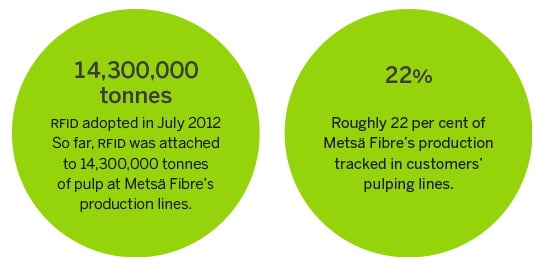The RFID (Radio Frequency Identification) tracking system is based on a small sticker that contains an electronic tag. A unique RFID tag is attached to every Metsä Fibre pulp unit.
"We were the first operator in the pulp industry to introduce the RFID tracking system in 2012. In many other sectors, the technology has been in use for a longer time", says Thomas Fant, Technical Customer Service Manager, Metsä Fibre.
The RFID tag contains a microchip that stores the pulp batch number and to which the batch data is assigned. The tracking tag can store more information than a barcode. With the RFID tracking method, the quantity, technical properties and latest location of a pulp delivery can be verified in real time.
"We hope that other operators in the pulp industry will also take the RFID tracking system in wider use. This would help customers track the origin and quality of the pulp they use", Fant says.
Fibre Online enables real-time tracking
The RFID tag is attached on both sides of a pulp unit with water-soluble glue. The tag can be scanned even if it was not visible. The tracking tag is scanned when the unit leaves the mill and at the harbour before transport.
The RFID scanner can be hand-held or fixed, for instance, at the mill's pulp conveyor. When the tag is scanned, Metsä Fibre's system connects the quality data of the pulp batch to the number sequence of the RFID tag and sends the data to the Fibre Online service.
Metsä Fibre's customer can check in advance in Fibre Online which shipment is going to arrive. This way, the customer can prepare for the arrival of the pulp batch and plan the production accordingly.
The RFID tracking tag eliminates shipping errors
RFID pulp tracking technology offers an efficient and reliable identification method. It assists both the pulp mill and the customer in real time. Real-time information exchange eliminates shipping errors and ensures correct deliveries. The tracking system creates an alert if a pulp batch that differs from the customer's order is selected for shipment.
"The data in the Fibre Online service is currently updated four times a day. In the future, we intend to also enable tracking the location of the shipment in real time", Fant says.
The RFID tag is scanned for the last time when the unit arrives at the customer's site. The tag disappears during slushing and does not need to be separately removed from the batch. However, the quality data concerning the pulp batch remain in the Fibre Online service, which enables the customer to also find out afterwards the batch number and pulp grade of each product.



